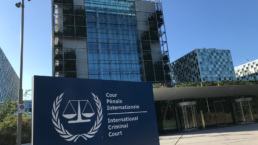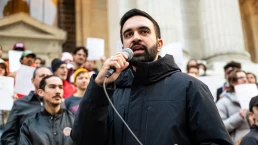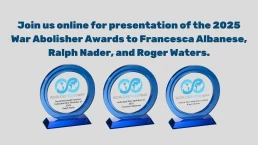South Africa’s willingness to file a case with the International Court of Justice is a sign that the old tactics used to police discourse about genocide have lost much of their power.
by Darryl Li, Dissent
Over the past three months, the charge that Israel is committing genocide in the Gaza Strip has gone from a protest chant to a formal hearing before the International Court of Justice (ICJ) in the Hague. We are experiencing a major upheaval in debates over the language of mass atrocity in the West. The mounting horrors in Gaza have reconfigured the international legal terrain, opening up political space even among experts and jurists accustomed to operating within the relatively narrow confines set by powerful states.
On October 15, over 800 scholars signed an open letter expressing concerns about possible genocide. This provided cover for nine independent UN human rights experts several days later to issue their own warning of a “risk of genocide,” kicking off a cascade of similar statements across the UN human rights system. While higher-level UN officials shied away from using the term due to fear of alienating the United States and other powerful allies of Israel, governments across the Global South began invoking genocide with increasing regularity and alarm.

Finally, it was South Africa that took the fateful step of initiating a case in the ICJ against Israel for violating its obligations under the 1948 UN Genocide Convention, to which Israel is a signatory. The ICJ has jurisdiction over disputes between states concerning the interpretation or application of the Genocide Convention. South Africa alleges that the convention creates obligations between all its signatories, allowing them to hold each other accountable for breaches; this argument is based on the precedent set in a similar ICJ case, whose final outcome is still pending, filed by Gambia alleging that Myanmar has committed genocide against its ethnic Rohingya minority.
Recent Posts
Politicians Are Betraying Gen Z On Climate
July 10, 2025
Take Action Now While Gen-Zers thrift, knit, crochet, and find other ways to reduce our footprints, Trump and the GOP are greenlighting more climate…
Trump’s Deportation Threat Against Zohran Mamdani Is Shameful
July 10, 2025
Take Action Now In only half a year of Donald Trump’s presidency, he and his allies have turned deportation into an explicitly political threat…
Teachers Union Votes To Cut Ties To The Anti-Defamation League
July 10, 2025
Take Action Now In a momentous vote, the National Education Association voted to cut all ties with the Anti-Defamation League. The reason? “Despite…
2025 War Abolisher Awards Go To Albanese, Nader, Waters
July 9, 2025
Take Action Now The purpose of the awards is to honor and encourage support for those working to abolish the institution of war itself.By World…




